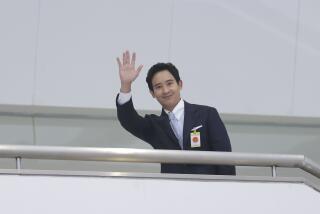Nepal’s Political Parties Are Muted by a System That Has Banned Them for 27 Years
- Share via
KATMANDU, Nepal — Banned for 27 years, political parties in Nepal are wilting as they wait for a chance to demonstrate their strength.
Politicians and diplomatic observers agree that there is no visible political activity in the impoverished Himalayan state of 17 million people except for elections to panchayats , or councils, from which parties are banned.
However, traditional politicians wedded to the idea of a working parliamentary democracy abound in a country ruled for centuries by Hindu kings.
“There is no official ban on our movement, but we are not allowed to hold public meetings,” said Ganesh Man Singh, former speaker of Parliament and leader of the Nepali Congress party, the dominant and best organized party until it was banned.
“We are in the political wilderness,” he added.
Man Singh and the rest of the Congress leadership were jailed for eight years when King Mahendra, father of the present King Birendra, dismissed Parliament in 1960 and disbanded political parties, ending an experiment with democracy after only 18 months.
Home From Exile
Freed in 1968, Prime Minister B. P. Koirala and the other detainees went in to exile in India and came home in 1976.
The king introduced the partyless system under which councilors are elected at village, district and national level, and power is concentrated in the hands of a few regional heads.
The system has bred corruption, and elected officials are more interested in what they can get for themselves, one diplomat said.
But former minister Jog Meher Shreshtha, a supporter of the partyless system, said, “Everybody says the leadership of the king is necessary. If we have a multi-party system, the king will become ineffective.”
However, Shreshtha favors political rapprochement with the opposition.
“On the basis of the partyless system we should call opposition leaders and talk to them. They are also thinking about the country. We are all for the country,” he added.
The diplomat, who declined to be identified, said anger against the system is rising in the countryside--where average per capita income is only $40 against a national average of $167--but there are no political forces into which it can be directed.
Divided Communists
He believed the people to watch were Communists, divided into 15 or 16 factions and active underground.
“The Communists are on their way up. They are vocal and have the image of being pro-people,” the diplomat said.
But even the Communists do not openly oppose the monarchy and were part of the coalition government formed by Koirala in 1959.
Some Congress leaders believe they should strive for a breakthrough by fighting elections, due in 1990, under the partyless system and then creating a constitutional crisis.
“There is great resentment against and disappointment with the partyless system among the masses,” said Girija Prasad Koirala, a Congress leader and younger brother of the former prime minister.
“There is no democracy, no freedom of the press, and corruption is rampant,” he said.
“We should go for constitutional struggle. We should fight the election and create a constitutional crisis,” Koirala said, adding that he is not against the monarchy, which by itself is popular.
Few Oppose King
Few people in Nepal, traditionally the abode of Hindu gods, oppose the monarchy. King Birendra’s family is believed to be descended from Lord Vishnu, the preserver among the gods.
Much opposition anger is directed against palace officials and aides without whose backing few things get done.
“The king is surrounded by sycophants. They don’t want to liberalize (the political system). Through this system they are enjoying fruits of corruption. The resentment is all over the country,” said Koirala.
More to Read
Sign up for Essential California
The most important California stories and recommendations in your inbox every morning.
You may occasionally receive promotional content from the Los Angeles Times.













